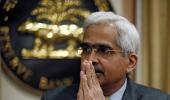Economists praise Shaktikanta Das for his pragmatism and willingness to face challenges head on.
And in doing so with the finesse of an able administrator.
Anup Roy reports.

The COVID-19 pandemic tested the resolve of authorities.
At the forefront of it was the Reserve Bank of India under a diminutive, low profile, former mandarin, Shaktikanta Das.
The crisis may not have blown over yet, but Das has tried to play an important role by doing 'whatever it takes' to blunt its impact.
The economy is now flush with liquidity -- Rs 7.4 trillion at the last reading, helping the government to borrow a record Rs 12 trillion at a 16-year-low average yield.
Corporates are gorging on easy money, with one-year rates quoting below the overnight repo rate.
The stimulus measures by the government have helped.
But much of the heavy lifting was done by the RBI.
"The economic recovery at a faster rate in large part is a result of the RBI bouquet of unconventional policy measures that clearly had the desired impact," says State Bank of India Chief Economist Soumya Kanti Ghosh.
The RBI governor, who completed two years in office on December 12, has been steadfastly focused on growth -- a diametrically opposite view of his predecessor, whose priority was inflation.
While Das has played his part in arresting the fall in growth, he will miss the inflation target for three quarters.
In response to the Covid crisis, the RBI has lowered its policy rates by 115 basis points (bps), taking the rate cuts to 250 bps since February 2019.
There may not be further rate cuts, but the real interest rates are in negative territory, which may not get fixed anytime soon.
Depositors are losing out, even as top-rated corporates are feasting on easy money -- something that cannot be said about all firms, despite the RBI's earnest endeavour to ease financing conditions for them.
The bond market, is of course, happy with the liquidity glut in the system, and despite the soft rate, it is cooperating 'without being combative'.
Former RBI deputy governor Viral Acharya warned recently that these ultra-low rates, fuelled by excess liquidity, and the penchant for banks to lend at unsustainably low rates to corporates, would 'come back to haunt us'.
It won't be easy for the central bank to get out of this.
The bond market, to start with, will become combative again at the first hint of liquidity withdrawal.
On the other hand, if liquidity sloshes around, a renewed surge of demand will translate into a wave of generalised inflation, which will demand rapid rise in interest rates, impacting growth.
'The need of the hour is to do whatever is necessary to shield the domestic economy from the pandemic,' the RBI governor proclaimed in March, when the nation went into lockdown.
It is not that everything was rosy before the pandemic.
The Indian economy was fast spiralling into a slowdown, and with one financial crisis after another raising its head, inflation always lurked around the corner.
Das was rather successful in steadying the rocking boat, say economists, though some issues seemed to have been set aside for the future.
For example, more than 70 depositors of the Punjab and Maharashtra Co-operative Bank have died so far, and yet there's no resolution in sight.
Still, there's no denying, that "it was literally a baptism by fire", says Ghosh.
Economists praise Das for his pragmatism and willingness to face challenges head on.
And in doing so with the finesse of an able administrator.
"Under him, the RBI delivered strong, timely, and decisive policy initiatives to deal with challenges such as the COVID-19 pandemic, non-banking financial company stress, YES Bank rescue, and bank moratorium," says Siddhartha Sanyal, chief economist of Bandhan Bank, adding the stability of the financial system was never at risk, despite several challenges.
Time and again, the RBI governor has assured depositors that no bank will be allowed to fail.
The bond market will always have ample liquidity.
Now that co-operative banks have come into the RBI fold, hopefully a PMC Bank-like crisis can see speedier closure.
The RBI moved fast to douse a crisis in the Lakshmi Vilas Bank and merged it with DBS Bank India.
Though it is being challenged by shareholders, depositors have been fully protected.
A consortium of banks saved YES Bank, thereby nixing any possibility of a financial meltdown.
A set of investors and bond holders lost out completely, but again, depositors -- the RBI's primary concern -- were saved.
Das also pulled up several high-profile executives of top banks, and asked them to leave for mismanaging the bank while earning fat cheques.
Recently, he imposed a ban on the country's premier private sector HDFC Bank for outages in banking services.
At the same time, there has been a silent revolution in round-the-clock payment processing.
Indian banks can now take positions in international markets, and efforts have been taken to bring the offshore derivatives trades onshore.
The Covid crisis, though, tested his resolve the most.
Responding to the crisis, in August, Das stated that the central bank's objective would be to 'prevent financial markets from freezing up, ensure normal functioning of financial intermediaries, ease the stress faced by households and businesses, and keep the lifeblood of finance flowing'.
The crisis is not over yet, but Das and his men have been very successful in averting a crisis, say experts.
Equated monthly instalments are being restructured and delayed by a year or two, and companies severely hit by the crisis have been told they need to request banks for a restructuring of loans by December 31.
His next big challenge will be to deal with the recommendation of an internal working group to let industrial houses run banks.
While the RBI decision on the issue is expected to be known in January, Das would require his formidable skills to reach a conclusion that doesn't ruffle too many feathers.
Feature Presentation: Aslam Hunani/Rediff.com











